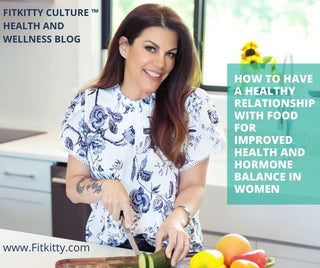How to Have a Healthy Relationship with Food for Improved Health and Hormone Balance in Women
Do you ever feel like your relationship with food could be better? Maybe you are overeating certain foods, feeling guilty after meals, or having difficulty making healthy choices. If so, know that you are not alone! Navigating our modern-day food culture can be tricky, but hope exists. With simple changes and lifestyle adjustments, you can form a strong connection with food and your body, promoting better physical and emotional health – plus hormone balance! In this blog post, we'll cover key tips on cultivating a healthier relationship with food for improved holistic well-being. Follow these tips to develop a healthy relationship with food:
- Eat intuitively, listen to your body's hunger and fullness cues, and eat mindfully.
- Avoid labeling food as "good" or "bad" and aim for balance and moderation.
- Eat a variety of foods, including fruits, vegetables, whole grains, lean proteins, and healthy fats.
- Practice mindfulness when eating by paying attention to your food's taste, texture, and smell.
- Avoid restrictive diets that can be harmful to your health and lead to an unhealthy relationship with food.
Benefits of a Healthy Relationship with Food
A healthy relationship with food has many benefits for your health, including the following:
- Improved physical health by reducing the risk of chronic diseases such as heart disease, diabetes, and cancer.
- Improved mental health by reducing stress and anxiety around eating.
- Increased energy levels and improved mood.
- Improved digestion and gut health.
Female Hormones and Food
The foods we eat can impact our hormones in several ways, which can be particularly important for women's reproductive health. Hormones play a critical role in regulating the menstrual cycle, fertility, and other aspects of reproductive health, and imbalances in these hormones can lead to a range of issues.
One essential hormone that can be impacted by diet is insulin. The pancreas produces insulin and helps regulate blood sugar levels by allowing cells to absorb glucose from the blood. When we eat foods high in sugar or refined carbohydrates, our bodies release a surge of insulin to process glucose. Over time, this can lead to insulin resistance, which means that our cells become less responsive to insulin, and glucose levels remain high in the blood. This can have some adverse effects on our health, including contributing to weight gain, inflammation, and an increased risk of developing type 2 diabetes.
In addition, insulin resistance can impact other hormones, including those critical for female reproductive health. For example, insulin resistance can lead to an increase in the production of androgens, which are male hormones that women produce in smaller amounts. Too much androgen production can disrupt the menstrual cycle, leading to irregular periods or amenorrhea (absence of periods). Androgen excess is also linked to polycystic ovary syndrome (PCOS), a hormonal disorder affecting fertility.
On the other hand, a diet rich in whole foods, such as fruits, vegetables, whole grains, and lean proteins, can help regulate hormones and promote reproductive health. These foods provide essential nutrients, including vitamins, minerals, and fiber, that support overall health and help keep hormones in balance. For example, fiber-rich foods can help regulate insulin levels and improve insulin sensitivity, reducing the risk of insulin resistance and hormone imbalances.
In conclusion, developing a healthy relationship with food is crucial for overall health and well-being. Following the tips outlined in this post and eating a balanced diet can improve your health and hormone balance as a woman. So, practice mindfulness when eating, listen to your body's cues, and enjoy the benefits of a healthy relationship with food.

